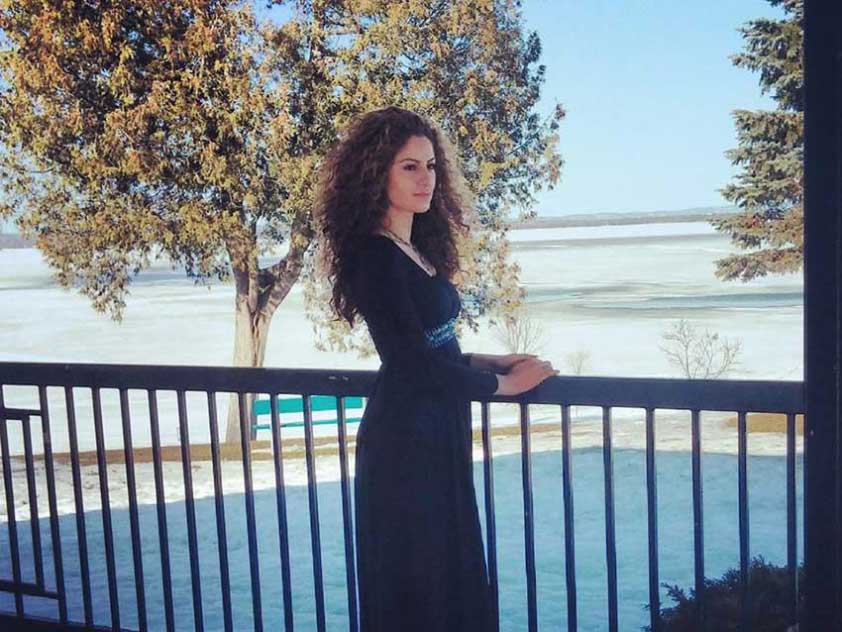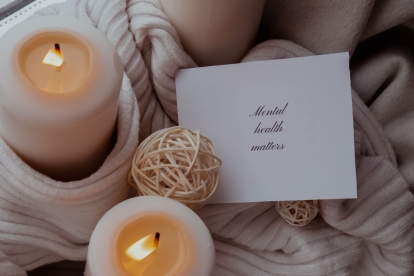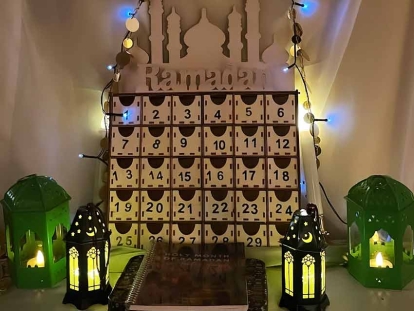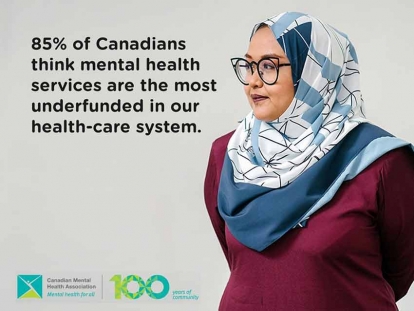 Assma Galuta, aka Asoomii Jay, shares about her journey with Thyroid Cancer
Courtesy of Assma Galuta
Assma Galuta, aka Asoomii Jay, shares about her journey with Thyroid Cancer
Courtesy of Assma Galuta
Dec
Fashion designer Assma Galuta, best known to her YouTube Fans as Asoomii Jay, is recovering from Thyroid Cancer. Muslim Link is grateful to Assma for sharing her very personal story with our readers in the hopes it will raise awareness about Thyroid Cancer and will help more young women coping with this experience know that they are not alone.
Thyroid Cancer has been rising dramatically in young women over the past twenty years. According to Cancer Care Ontario "The incidence of thyroid cancer in 15–29 year-old women in Ontario increased rapidly at an average rate of 5% per year between 1981 and 2009, and this disease accounted for 25.2% of new cancer diagnoses between 2000 and 2009."
1. Tell us about yourself.
Ethnically North African, Culturally Canadian, I was born and raised in Ottawa. I'm 24 years young and currently studying Psychology with a minor in Religion Studies at Carleton University. I am an activist, blogger, model, and designer. I began my own clothing and hijab line in 2012 under my online nickname, Asoomii Jay, and in turn my YouTube channel kicked off.
I was interviewed on a radio station in South Africa for my accomplishment for creating a name and business for myself at a young age on my own. My Hijab Tutorials from my YouTube channel were featured in Iraqi Fashion TV, and
for being featured as a fashion designer in Ottawa's first Indigenous Fashion Show in 2013.Unfortunately I had to put my business on hold due to finishing university and health issues but the experience opened up my eyes to future opportunities and projects Insha'Allah (God willing).
2. How did you learn that you had thyroid cancer?
In the summer of 2013 I went to my family doctor to get my yearly checkup. As she checked my neck she noticed the right side of my neck was swelled up. I noticed the swelling but disregarded it as a month before I had caught pneumonia and assumed it would go down on its own. Also, due to the fact that I had been previously diagnosed with severe depression and anxiety, she told me that my thyroid might not be functioning properly. I was referred to an imaging clinic on the same day to get an ultrasound for my neck and so the journey began.
3. What process did you go through in order to decide how to treat it?
To be honest I was in shock and confused. I let my doctor decide what was best for me. I had no previous knowledge or personal experience from someone around me, so I automatically assumed a doctor would know what would be best for my health. I say 'assumed' because now that I am more knowledgeable and have gone through the experience, I still live in fear of developing other cancers or leukemia from the radiation I had to kill the cancer. The radiation and medication also had very harmful effects such as nausea, hair loss, teeth deterioration, extreme fatigue and the list goes on. I am thankful and blessed to be cancer free, but I wish I had done a radioactive-free and natural method to kill the cancer to prevent future cancers.
The day my results were available, I woke up to 4 missed calls from my family doctor. She informed me that it was urgent to come in as soon as possible. I rushed to the doctor's office and she informed me that the ultrasound showed a growth with abnormal cells. She immediately referred me to the hospital to get a needle biopsy. The biopsy showed that I had a tumor with malignant Hurthle cancer cells. I was referred to another hospital to do another biopsy to get a second opinion. The results came back the same. I was diagnosed with Thyroid Cancer.
I was put on a waiting list for months to have my thyroid removed and finally in February I got the call and scheduled the surgery date. The surgery was 5 hours long and I spent 5 days in the hospital to recover. The doctor suggested that I do the radio-active iodine therapy. So in August I was put on another waiting list to have therapy to kill the remaining cancer cells that were found near the lymph nodes on the left side of my neck. I was in isolation for 4 days and had to stay away from children and public areas for the following week. It was quite exhausting but Alhamdulillah (Thanks to God) worth it.
4. What impact did the diagnosis have on your life, particularly as you are a young person?
It took a tremendous mental and physical toll on me. Physically I was exhausted, sleeping up to 16 hours per day at the beginning and the side effects of the therapy and medication was so painful some days I would wake up and wonder why God hadn't taken me away already. Mentally, my anxiety, paranoia and depression got worse. Friends left my side because no one wanted to deal with someone who was "dying," depressed, and who had emotional outbursts. My family was overseas when I was doing radiation so it was very hard to adjust to it and deal with it on my own. When my mother came back from overseas, some nights I would hear her crying and it tore my heart. I felt like a burden on everyone and learnt to detach from feelings and people and to keep my struggles to myself.
People were intimidated by my scar on my neck and would steer clear. Some would even assume that I tried to hang myself and failed. I felt like a freak show, I lost people around me, and my confidence and faith began to shake.
5. If you now no longer have a thyroid, what is your new reality like?
People don't understand what an important role the thyroid plays in our body. It makes, stores, and releases hormones that affect almost every cell in your body, and helps to control your body's functions. Without a thyroid I developed mental illnesses (anxiety, my adhd got worse, severe depression). My hair was falling out for a period of time, my skin condition became very bad and I developed acne. I lost weight, and I began fainting and having severe migraines. I was put on medication to help relieve some of these symptoms. I had nausea and was vomiting frequently.
I am always cold, tired, in pain, and my concentration and memory got affected as well. I have been put on other medications on top of a synthetic hormone replacement that I must take for the rest of my life so I can try to lead a normal lifestyle. I was told I wouldn't feel "normal" again until my dosages have been stabilized which can take up to 2 years. So for now, I am trying to adjust to my new normal, and control my anxiety.
6. What role has your Muslim faith played in how you have coped with your illness and recovery?
It took me a very long time to come to terms with everything that I have been through in my life on top of the cancer. I used to be very angry at the world, and was confused as to why this was happening to me. For a period of time, I was in my own world and became angry at Allah.
One night, I don't even remember it as I was completely out of it, I attempted to commit suicide, but something snapped in me and my fear of turning my back on Allah and getting punished by going to hell forever (by taking a life that isn't mine to take) brought me back to reality. This life was granted to me by Allah. And I began to look at those who had it worse off than me and I began to appreciate life more. Every time I began to question things, I would remind myself that Allah is testing our patience and faith in him, and that he has a plan for us even if we don't see it.
I also began to talk to Allah again every day; it comforted me knowing he is always listening to us. Even if these days are hard, I remind myself everything is temporary. If something bad happens, we should be patient as it will go away. And if something good happens, to appreciate it as it will also go away. My outlook on life also changed. I forced myself to change my perspective and learn to detach from things beyond my control. If it's out of my control, why worry and make myself even more sick? I just have to learn to be content and let it go. As well, looking forward to the afterlife, is what keeps me going, after all this life is nothing but a temporary test. I feel my faith in Allah has played a huge role in helping me cope and go on.
7. What would you like more people to know about thyroid cancer?
I would like people to educate themselves more on Thyroid Cancer. Doctors say it is the "best cancer to have" due to it having a higher survival rate than other cancers but that is not the case. Thyroid Cancer causes one to lose a vital organ that is responsible for various bodily functions and hormones. It is not just "taking one pill a day for the rest of your life and you're good to go". It's dealing with mental illnesses, panic attacks, and the side effects of other medications we have to take for other conditions that arise from losing a vital organ. It's learning to control your emotional outbursts and paranoia. One time, I cried for 15 minutes straight as if a loved one passed away, simply over finishing a perfume bottle. To any rational person, they would simply say "I need to get some more perfume", but I could not understand or explain to anyone why I was so emotional and crying over nothing.
We are the ones who have to deal with it so it upsets me when people say THEY don't want to deal with a sick person. Good support, positive encouragement, and faith in us is what we need.
8. According to the Cancer Care Ontario, the rates of thyroid cancer among young women is rising dramatically? Do you feel this is something more young women need to be aware of?
Thyroid cancer is fast on the rise and doctors are baffled and don't know the reason. Maybe it's the processed foods we eat, the radiation from cell phones and laptops we use, the toxins in the environment, or it can be anything. Many thyroid tumors are discovered incidentally from getting checked for other reasons such as neck pain, or inflammation, and it is the leading cancer among young women between the ages of 15-29. Studies show at this rate, thyroid cancer might be the leading cancer in a few decades.
I strongly believe that this is something more young women need to be aware of. I urge young women to get their neck checked when doing a yearly check-up and to never ignore any symptoms. I have changed my lifestyle and urge others to do so as well. I eat healthier and work out. I try to refrain from using hair dyes and products with chemicals and opt for more natural alternatives.
This life was given to us as a blessing and we need to take care of it. If it can happen to me, it can happen to anyone.
Further Reading:
Canadian Cancer Society Website
Thyroid Cancer
Risk Factors for Thyroid Cancer
Risk Reduction Strategies for Thyroid Cancer
Signs and Symptoms of Thyroid Cancer
The Thyroid Foundation of Canada Website
Thyroid Cancer
The Thyroid and the Mind and Emotions/Thyroid Dysfunction and Mental Disorders by A.G. Awad, MD, BCH, PhD, FRCP(C) Associate Professor of Psychiatry, University of Toronto
The Thyroid Cancer Canada Website
Thyroid Cancer Explained
Negotiating the Emotional Ups and Downs of Thyroid Cancer: For Patients, Family and Friends
This article was produced exclusively for Muslim Link and should not be copied without prior permission from the site. For permission, please write to info@muslimlink.ca.


